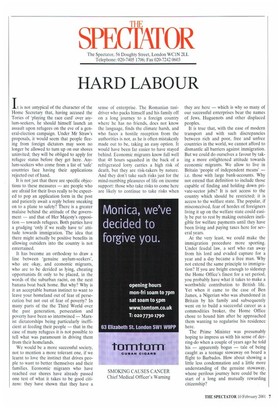HARD LABOUR
It is not untypical of the character of the Home Secretary that, having accused the Tories of 'playing the race card' over asylum-seekers, he should himself launch an assault upon refugees on the eve of a general-election campaign. Under Mr Straw's proposals, it would seem that people fleeing from foreign dictators may soon no longer be allowed to turn up on our shores uninvited; they will be obliged to apply for refugee status before they get here. Asylum-seekers who come from a list of 'safe' countries face having their applications rejected out of hand.
It is not just that there are specific objections to these measures — are people who are afraid for their lives really to be expected to pop an application form in the post and patiently await a reply before sneaking on to a plane to safety? There is a greater malaise behind the attitude of the government — and that of Her Majesty's opposition — towards refugees. Both parties have a grudging 'only if we really have to' attitude towards immigration. The idea that there might actually be positive benefits in allowing outsiders into the country is not entertained.
It has become an orthodoxy to draw a line between 'genuine asylum-seekers', who are okay, and economic migrants, who are to be derided as lying, cheating opportunists fit only to be placed, in the words of the suburban racist, on the next banana boat back home. But why? Why is it an acceptable human instinct to want to leave your homeland out of fear of persecution but not out of fear of poverty? In many parts of the the Third World over the past generation, persecution and poverty have been so intertwined — Marxist dictatorships being particularly inefficient at feeding their people — that in the case of many refugees it is not possible to tell what was paramount in driving them from their homelands.
We would be a more successful society, not to mention a more tolerant one, if we learnt to love the instinct that drives people to want to better themselves and their families. Economic migrants who have reached our shores have already passed one test of what it takes to be good citizens: they have shown that they have a
sense of enterprise. The Romanian taxidriver who packs himself and his family off on a long journey to a foreign country where he has no friends, does not know the language, finds the climate harsh, and who faces a hostile reception from the authorities is not, as he is often mistakenly made out to be, taking an easy option. It would have been far easier to have stayed behind. Economic migrants know full well that 48 hours squashed in the back of a refrigerated lorry carries a high risk of death, but they are risk-takers by nature. And they don't take such risks just for the mind-numbing pleasures of life on income support: those who take risks to come here are likely to continue to take risks when they are here — which is why so many of our successful enterprises bear the names of Jews, Huguenots and other displaced peoples.
It is true that, with the ease of modern transport and with such discrepancies between rich and poor, free and unfree countries in the world, we cannot afford to dismantle all barriers against immigration. But we could do ourselves a favour by taking a more enlightened attitude towards economic migrants. We allow to live in Britain 'people of independent means' — i.e. those with large bank-accounts. Why not extend that definition to include those capable of finding and holding down private-sector jobs? It is not access to the country which should be restricted; it is access to the welfare state. The popular, if misconceived, fear of hordes of foreigners living it up on the welfare state could easily be put to rest by making outsiders ineligible for welfare payments until they have been living and paying taxes here for several years.
At the very least, we could make the immigration procedure more sporting. Under feudal law, a serf who ran away from his lord and evaded capture for a year and a day became a free man. Why not extend the same principle to immigration? If you are bright enough to sidestep the Home Office's finest for a set period, you probably have what it takes to make a worthwhile contribution to British life. Yet when it came to the case of Ben James, a Nigerian who was abandoned in Britain by his family and subsequently went on to build a successful career as a commodities broker, the Home Office chose to hound him after he approached them wanting to regularise his residence here.
The Prime Minister was presumably hoping to impress us with his sense of derring-do when a couple of years ago he told his — apparently bogus — tale of being caught as a teenage stowaway on board a flight to Barbados. How about showing a little less condemnation and a little more understanding of the genuine stowaway, whose perilous journey here could be the start of a long and mutually rewarding citizenship?


































































 Previous page
Previous page